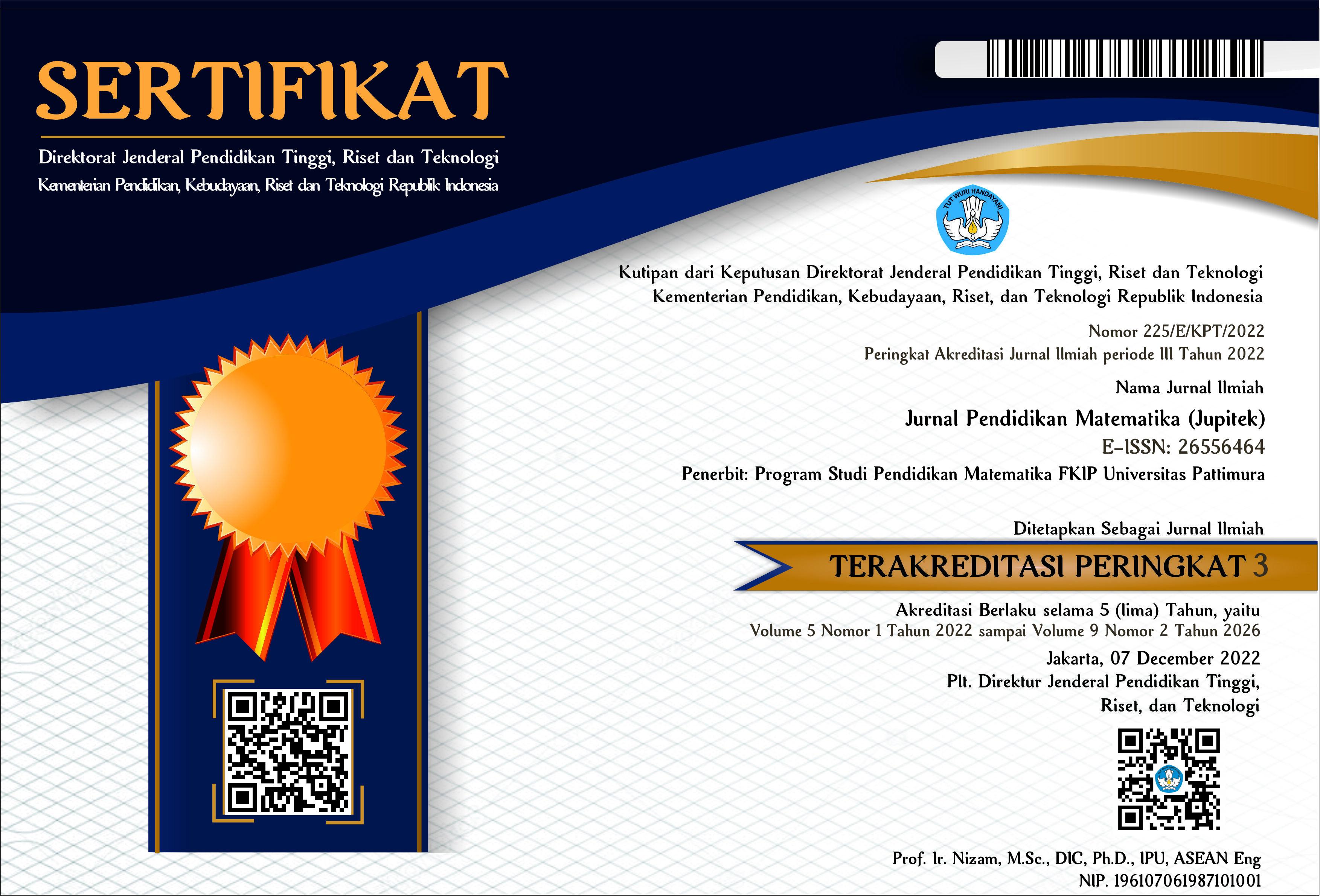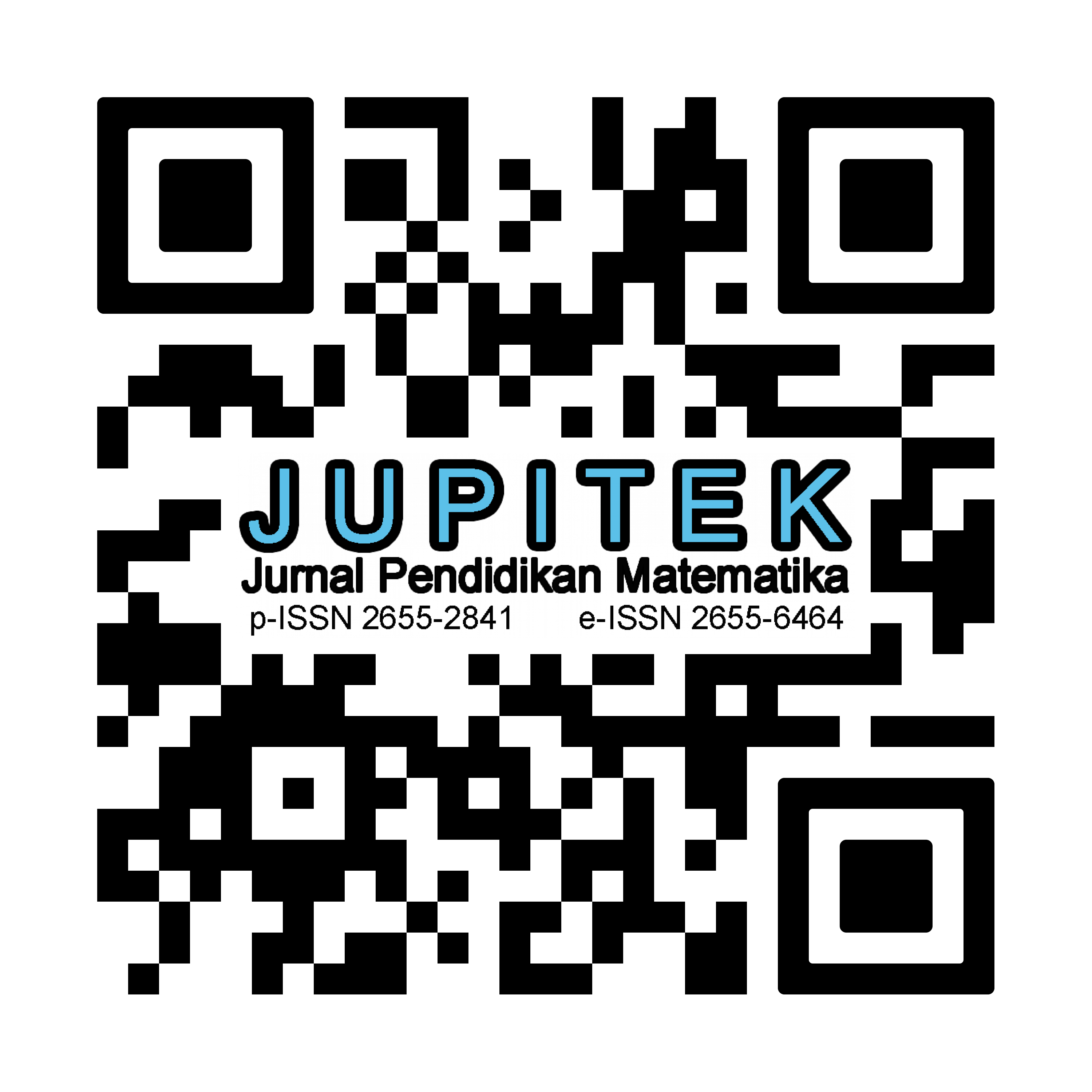PENGEMBANGAN PERANGKAT PEMBELAJARAN MATERI PERSEGI DAN PERSEGI PANJANG MENGGUNAKAN STRATEGI REACT
Abstract
Education in the present has become a necessity, the need for knowledge gained through the learning process both in school and learning from the environment of residence. Mathematical skills are important for everyday life, when students work in activities that are based on everyday life situations; they see ways of applying the mathematical skills they are learning to the real world. Thelearning strategy REACT is one of the learning strategies that use the environment as a source of learning. Besides the teaching learning process with active student learning methods (CBSA) the teacher must be more active in preparing lesson material, planning the process to be carried out such as RPP, preparing evaluation such as LKS and follow-up. From the results of the study the development of learning tools for student activities reached 91.25% and the success rate of students reached 70%. Thus the development of a square and rectangular learning device using theREACTstrategy has a good effect on student activity and student learning outcomes
Downloads
References
Ahmadi,K.Iif& Sofan Amri,2014.Pengembangan & Model Pembelajaran Tematik Integratif. Jakarta :Prestasi Pustaka
Crawford, L. Michael. 2011. Teaching Contextually, Research, Rationale, And Techniques for Improving Students Motivation and Achievement in Mathematics and science.Cord.Oktober 2001. (diakses pada 22 januari 2018).
Firda dkk.2016.Penerapan Strategi REACT (Relating, Experiencing, Applying, Cooperating, Transfering) untuk Meningkatkan Kemampuan Koneksi Matematika Siswa pada Pokok Bahasan Bangun Datar dikelas VII-2 SMP Negeri 47 Jakarta. (diakses 11 februari 2018).http://jurnal.unj.ac.id/unj/index.php/jrpms/article/download/3029/2190
Joyce bruce, dkk . 2009. Models of Teaching Model-Model Pembelajaran.Yogyakarta : Pustaka Pelajar
Muschla,A. Judith dan Gary Robert Muschla.2009.Pedoman Praktis Tugas-Tugas Matematika dengan Aplikasi Kehidupan Nyata Sehari-Hari.Jakarta : PT Indeks
Laurens T, Laamena C dan Mattitaputty C. 2014. Delopment A Set of Instructional Learning Based Realistic Mathematics Education and Local Wisdon. Prosiding1st ISIM-MED 2014. EP 571-576. Nopember 26-30 2014.
Thobroni Muhammad & Arif Mustafa.2012. Belajar dan pembelajaran Pengembangan wacana dan Praktik Pembelajaran dalam pembagunan nasional. Jogjakarta: Ar-Ruzz Media
Uno,B. Hamzah. 2007. Model Pembelajaran Menciptakan Proses Belajar Mengajar yang Kreatif dan Efektif.Jakarta : PT Bumi Aksara
Copyright (c) 2018 Maiviyani Maiviyani, Theresia Laurens, Christi Matitaputty

This work is licensed under a Creative Commons Attribution-NonCommercial-ShareAlike 4.0 International License.
License and Copyright Agreement
By submitting a manuscript to Jurnal Pendidikan Matematika (JUPITEK), the author(s) certify and agree to the following terms:
- Originality and Authority: The submitting author is authorized by all co-authors to enter into this agreement. The manuscript describes original work that has not been published previously in a peer-reviewed journal, nor is it under consideration for publication elsewhere.
- Approval: Its publication has been approved by all author(s) and by the responsible authorities of the institutions where the work was carried out.
- Rights: The authors secure the right to reproduce any material that has already been published or copyrighted elsewhere.
- Licensing and Copyright: Authors retain the copyright to their work.
- License Grant: The authors grant Jurnal Pendidikan Matematika (JUPITEK) the right of first publication, with the work simultaneously licensed under the Creative Commons Attribution-NonCommercial-ShareAlike 4.0 International (CC BY-NC-SA 4.0).
- Self-Archiving: Authors are permitted and encouraged to deposit the published version of their article in institutional repositories, on their personal websites, and other academic platforms, with proper acknowledgment of its initial publication in Jurnal Pendidikan Matematika (JUPITEK).






.png)


